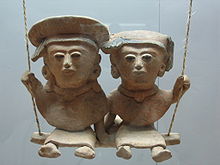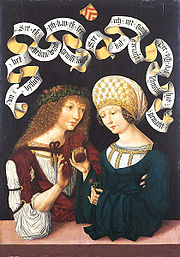The word "love" can have a variety of related but distinct meanings in different contexts. Often, other languages use multiple words to express some of the different concepts that English relies mainly on "love" to encapsulate; one example is the plurality of Greek words for "love." Cultural differences in conceptualizing love thus make it doubly difficult to establish any universal definition.[10]
Although the nature or essence of love is a subject of frequent debate, different aspects of the word can be clarified by determining what isn't love. As a general expression of positive sentiment (a stronger form of like), love is commonly contrasted with hate (or neutral apathy); as a less sexual and more emotionally intimate form of romantic attachment, love is commonly contrasted with lust; and as an interpersonal relationship with romantic overtones, love is sometimes contrasted with friendship, although the word love is often applied to close friendships.
When discussed in the abstract, love usually refers to interpersonal love, an experience felt by a person for another person. Love often involves caring for or identifying with a person or thing (cf. vulnerability and care theory of love), including oneself (cf. narcissism). In addition to cross-cultural differences in understanding love, ideas about love have also changed greatly over time. Some historians date modern conceptions of romantic love to courtly Europe during or after the Middle Ages, although the prior existence of romantic attachments is attested by ancient love poetry.[11]
Because of the complex and abstract nature of love, discourse on love is commonly reduced to a thought-terminating cliché, and there are a number of common proverbs regarding love, from Virgil's "Love conquers all" to The Beatles' "All You Need Is Love". St. Thomas Aquinas, following Aristotle, defines love as "to will the good of another."[12] Bertrand Russell describes love as a condition of "absolute value," as opposed to relative value.[citation needed]Philosopher Gottfried Leibniz said that love is "to be delighted by the happiness of another."[13] Biologist Jeremy Griffith defines love as "unconditional selflessness".[14]
Love is sometimes referred to as being the "international language", overriding cultural and linguistic divisions.
Impersonal love
A person can be said to love an object, principle, or goal if they value it greatly and are deeply committed to it. Similarly, compassionate outreach and volunteer workers' "love" of their cause may sometimes be born not of interpersonal love, but impersonal love coupled with altruism and strong spiritual or political convictions.[15] People can also "love" material objects, animals, or activities if they invest themselves in bonding or otherwise identifying with those things. If sexual passion is also involved, this condition is called paraphilia.[16]
Interpersonal love
Interpersonal love refers to love between human beings. It is a more potent sentiment than a simple liking for another. Unrequited love refers to those feelings of love that are not reciprocated. Interpersonal love is most closely associated with interpersonal relationships.[15] Such love might exist between family members, friends, and couples. There are also a number of psychological disorders related to love, such as erotomania.
Throughout history, philosophy and religion have done the most speculation on the phenomenon of love. In the last century, the science of psychology has written a great deal on the subject. In recent years, the sciences of psychology, anthropology, neuroscience, and biology have added to the understanding of the nature and function of love.
Biological basis
Biological models of sex tend to view love as a mammalian drive, much like hunger or thirst.[17] Helen Fisher, a leading expert in the topic of love, divides the experience of love into three partly overlapping stages: lust, attraction, and attachment. Lust is the feeling of sexual desire; romantic attraction determines what partners mates find attractive and pursue, conserving time and energy by choosing; and attachment involves sharing a home, parental duties, mutual defense, and in humans involves feelings of safety and security.[18] Three distinct neural circuitries, including neurotransmitters, and three behavioral patterns, are associated with these three romantic styles.[18]
Lust is the initial passionate sexual desire that promotes mating, and involves the increased release of chemicals such as testosterone and estrogen. These effects rarely last more than a few weeks or months. Attraction is the more individualized and romantic desire for a specific candidate for mating, which develops out of lust as commitment to an individual mate forms. Recent studies inneuroscience have indicated that as people fall in love, the brain consistently releases a certain set of chemicals, including pheromones, dopamine, norepinephrine, and serotonin, which act in a manner similar to amphetamines, stimulating the brain's pleasure center and leading to side effects such as increased heart rate, loss of appetite and sleep, and an intense feeling of excitement. Research has indicated that this stage generally lasts from one and a half to three years.[19]
Since the lust and attraction stages are both considered temporary, a third stage is needed to account for long-term relationships. Attachment is the bonding that promotes relationships lasting for many years and even decades. Attachment is generally based on commitments such as marriage and children, or on mutual friendship based on things like shared interests. It has been linked to higher levels of the chemicals oxytocin and vasopressin to a greater degree than short-term relationships have.[19] Enzo Emanuele and coworkers reported the protein molecule known as the nerve growth factor (NGF) has high levels when people first fall in love, but these return to previous levels after one year.[20]
Psychological basis
Psychology depicts love as a cognitive and social phenomenon. Psychologist Robert Sternberg formulated a triangular theory of love and argued that love has three different components: intimacy, commitment, and passion. Intimacy is a form in which two people share confidences and various details of their personal lives, and is usually shown in friendships and romantic love affairs. Commitment, on the other hand, is the expectation that the relationship is permanent. The last and most common form of love is sexual attraction and passion. Passionate love is shown in infatuation as well as romantic love. All forms of love are viewed as varying combinations of these three components. Non-love does not include any of these components. Liking only includes intimacy. Infatuated love only includes passion. Empty love only includes commitment. Romantic love includes both intimacy and passion. Companionate love includes intimacy and commitment. Fatuous love includes passion and commitment. Lastly, consummate love includes all three.[21] American psychologist Zick Rubin sought to define love by psychometrics in the 1970s. His work states that three factors constitute love: attachment, caring, and intimacy.[22] [23]
Following developments in electrical theories such as Coulomb's law, which showed that positive and negative charges attract, analogs in human life were developed, such as "opposites attract." Over the last century, research on the nature of human mating has generally found this not to be true when it comes to character and personality—people tend to like people similar to themselves. However, in a few unusual and specific domains, such as immune systems, it seems that humans prefer others who are unlike themselves (e.g., with an orthogonal immune system), since this will lead to a baby that has the best of both worlds.[24] In recent years, various human bonding theories have been developed, described in terms of attachments, ties, bonds, and affinities. Some Western authorities disaggregate into two main components, the altruistic and the narcissistic. This view is represented in the works of Scott Peck, whose work in the field of applied psychology explored the definitions of love and evil. Peck maintains that love is a combination of the "concern for the spiritual growth of another," and simple narcissism.[25] In combination, love is an activity, not simply a feeling.
Psychologist Erich Fromm maintained in his book The Art of Loving that love is not merely a feeling but is also actions, and that in fact, the "feeling" of love is superficial in comparison to one's commitment to love via a series of loving actions over time.[15] In this sense, Fromm held that love is ultimately not a feeling at all, but rather is a commitment to, and adherence to, loving actions towards another, oneself, or many others, over a sustained duration.[15] Fromm also described love as a conscious choice that in its early stages might originate as an involuntary feeling, but which then later no longer depends on those feelings, but rather depends only on conscious commitment.[15]
Evolutionary basis
Evolutionary psychology has attempted to provide various reasons for love as a survival tool. Humans are dependent on parental help for a large portion of their lifespans compared to other mammals. Love has therefore been seen as a mechanism to promote parental support of children for this extended time period. Another factor may be that sexually transmitted diseases can cause, among other effects, permanently reduced fertility, injury to the fetus, and increase complications during childbirth. This would favor monogamous relationships over polygamy.[26]
Comparison of scientific models
Biological models of love tend to see it as a mammalian drive, similar to hunger or thirst.[17] Psychology sees love as more of a social and cultural phenomenon. Certainly love is influenced by hormones (such as oxytocin), neurotrophins(such as NGF), and pheromones, and how people think and behave in love is influenced by their conceptions of love. The conventional view in biology is that there are two major drives in love: sexual attraction and attachment. Attachment between adults is presumed to work on the same principles that lead an infant to become attached to its mother. The traditional psychological view sees love as being a combination of companionate love and passionate love. Passionate love is intense longing, and is often accompanied by physiological arousal (shortness of breath, rapid heart rate); companionate love is affection and a feeling of intimacy not accompanied by physiological arousal.






 love in english
love in english
